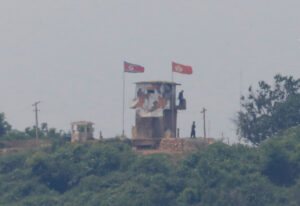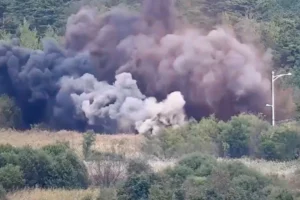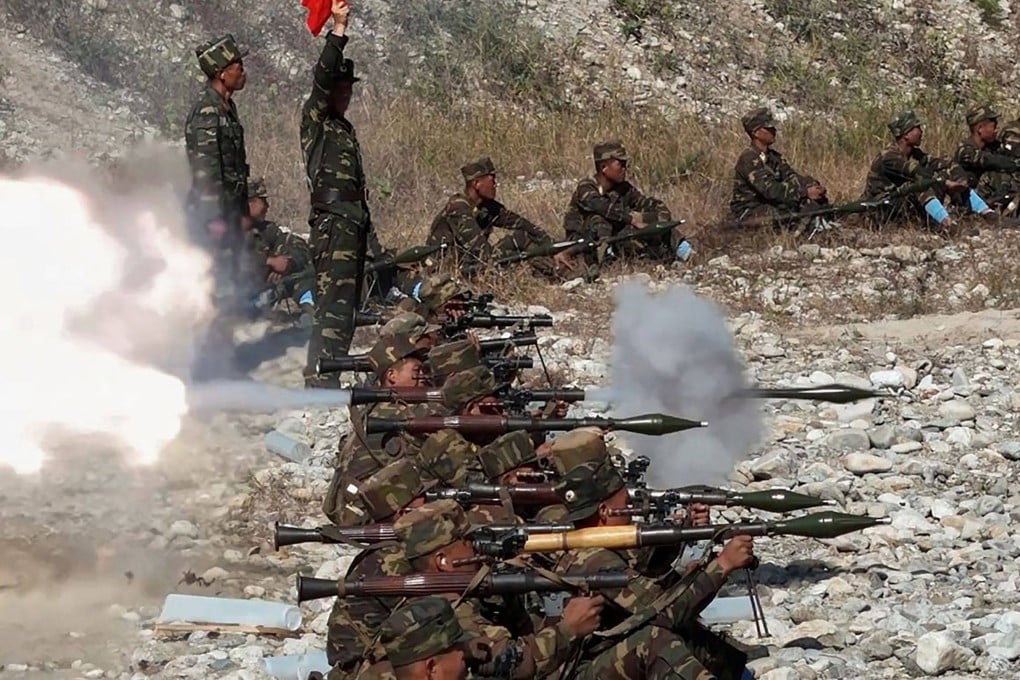South Korea’s Seoul —
Following Pyongyang’s warning that it would take action to cut off its territory from the South entirely, North Korea blew up portions of two main roads that connect to the southern half of the peninsula on Tuesday, according to South Korean authorities.

According to Seoul’s Joint Chiefs of Staff (JCS), at approximately 12 p.m. Korean local time, explosives damaged portions of the Gyeongui line on the west coast and the Donghae line on the east coast, two important road and railway routes connecting the North and South.
The two Koreas are still separated by one of the most highly defended borders in the world, and the roads were abandoned for years, so practically speaking, it doesn’t matter if the transport routes are destroyed. However, the timing of its symbolism coincides with very heated language between the two Korean leaders.

Several explosions were seen on roadways on the north side of the military demarcation line separating the two Koreas, according to footage released by the South Korean Defense Ministry. The video then shows the deployment of heavy equipment, such as trucks and excavators, to at least one of the roadways, which was partially blocked by a black barrier. The JCS did not provide any further details, just stating that the North was carrying out “additional works with heavy machinery” at the location.
The South Korean military responded to the explosions by firing artillery south of the military demarcation line. The JCS stated that the South Korean military is keeping a “fully readiness posture under cooperation with the US” and is closely observing the movements of the North Korean military.
South Korea warned that the explosions might happen soon after announcing Monday that it had found evidence that North Korea was getting ready to destroy the roadways that link the two nations. The Defense Ministry stated that its military has taken countermeasures, although it did not elaborate.

The South Korean military discovered individuals working behind barricades erected on the highways on the North’s side of the border, according to Lee Sung-joon, a spokesman for the JCS.
The explosions occur a few days after North Korea, in the latest tit-for-tat exchange after Pyongyang sent trash-filled balloons to the South for months, accused South Korea of flying drones loaded with propaganda above its capital, Pyongyang, and vowed “retaliation.”
After North Korean leader Kim Jong Un abandoned a long-standing strategy of pursuing peaceful reunification with the South earlier this year, the North Korean army issued a warning this week that it would take the “substantial military step” of totally sealing off its territory from South Korea.
Since an armistice agreement ended the Korean War in 1953, North and South Korea have been divided. Although the two governments have long aimed for reunification, the two sides are still officially at war.
According to KCNA at the time, Kim declared in January that North Korea would no longer pursue rapprochement and reunification with South Korea, referring to inter-Korean relations as “a relationship between two hostile countries and two belligerents at war.”
A “severe military circumstance”
The general staff of the Korean People’s Army (KPA) announced in a statement released by state-run news agency KCNA on October 9 that the remaining roads and railroads that connect to the South will be cut off entirely, preventing access along the border.
He stated in the KCNA notice, which used the initials of North Korea’s official name, the Democratic People’s Republic of Korea, that “the acute military situation prevailing on the Korean peninsula requires the armed forces of the DPRK to take a more resolute and stronger measure in order to more creditably defend the national security.”
According to the general staff, the actions were a reaction to recent “war exercises” that took place in South Korea and visits by what it alleges are strategic nuclear assets of the United States in the area. Pyongyang has reacted angrily to US aircraft carriers, amphibious assault ships, long-range bombers, and submarines visiting South Korea in the last year.
The South Korean military claims that Pyongyang has strengthened its border fortifications since January by erecting anti-tank traps, laying field mines, and demolishing railway infrastructure.
The use of inflammatory rhetoric has also increased by the leaders of North and South Korea.
Following South Korea’s president’s warning that the North would “face the end of its regime” if it utilized nuclear weapons, Kim threatened earlier this month to use them to destroy South Korea in the event of an assault.
The remarks coincided with growing Western anxiety over the isolated country’s course as North Korea seemed to have stepped up its nuclear manufacturing activities and deepened its connections with Russia.
North Korea’s decision to isolate its territory from the South, according to Leif-Eric Easley, a professor at Seoul’s Ewha Womans University, may be an attempt by Kim to “shift blame for its economic failures and legitimize its costly buildup of missiles and nuclear weapons” by inflating foreign threats.
“Kim Jong Un may be motivated by political weakness, but he wants audiences at home and abroad to think he is acting with military might,” he said. “A hereditary dictatorship’s strategy for surviving is reflected in North Korea’s rhetorical and actual threats.”
